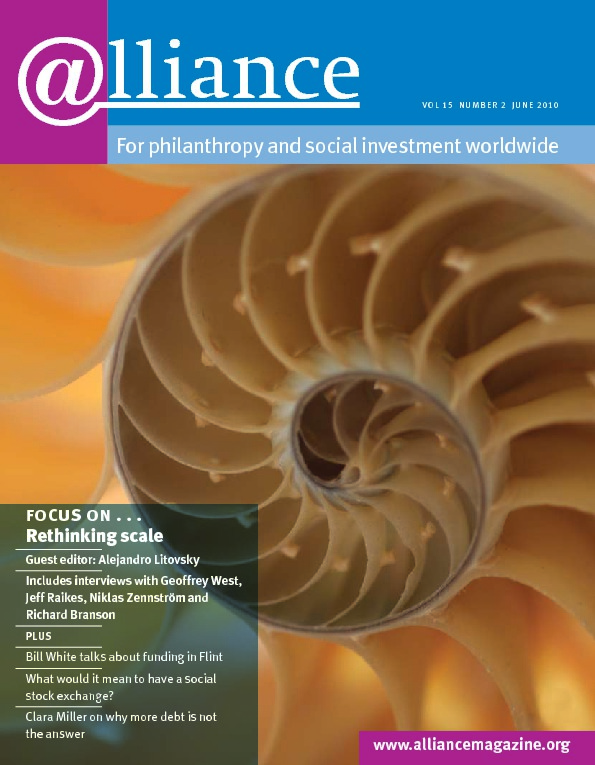Stagecoach Theatre Arts Schools plc, Parry People Movers, Good Energy plc, Radicle Projects, Eaga plc and Adilli are all social businesses that have chosen to ‘go public’ and be listed on a stock exchange. The surprising thing is not that these social enterprises have decided to try to raise the long-term financing they need from private capital but that so few have taken this path.
This situation may be about to change with the creation of a focused capital market. The idea of a ‘social stock exchange’ is being explored in the UK – and in Singapore, South Africa, the USA and Europe – with the support of the Rockefeller Foundation and some family offices including Halloran Philanthropies. What would this mean, and how would it differ from other so-called ‘social stock exchanges’?
Foundations in the UK alone have some £50 billion worth of assets. Just a small portion of this, if smartly invested, could make a big difference to the social business sector. While campaigns such as http://www.moreformission.com have raised awareness of impact investing, especially in the US, on the whole – and certainly in the UK – charity fund managers continue to be wary of mission related investing and have yet to navigate their way around the ‘social enterprise’ end of the public markets space.
So why are there not more imaginative solutions to funding being explored via the public capital markets? Looking at the needs of the sector, is it possible that third sector organizations – through specialist corporate vehicles such as Community Interest Companies, B Corporations or LC3 companies – could raise capital and become competitive service delivery providers? Is there another model beyond the typically diametrically opposed purely profit-maximizing or purely philanthropic?
How the social stock exchange began
After some 20 years in the City, working in social investment, I could see that of the 50,000+ businesses listed on stock exchanges around the world, a growing number of them found their roots – or their roles – in the social enterprise space. While many of them identify themselves as part of a distinctive grouping, not many investors were aware of their existence or success. This is where the idea of creating a focused capital market comes in.
In 2006, I chaired a group of social investors who were similarly keen to find more effective ways for social businesses to raise equity risk finance from City investors. At the end of 2007, Sir Ronald Cohen launched the report Developing a Social Equity Capital Market[1] at the London Stock Exchange. According to the report, the things that matter to social entrepreneurs seeking to raise capital are:
- maintaining ownership;
- attracting investors with a long-term perspective;
- limiting speculation in the capital market;
- control over social mission;
- finding investors with an understanding of social as well as financial return.
For their part, investors seeking a social investment opportunity require:
- regular reporting and disclosure;
- liquidity of shares;
- independent mechanism for valuation;
- clarity of financial and social return expectations;
- a market with FSA-regulated status.
The report concluded: ‘As social purpose businesses continue to expand, it is clear that a market mechanism to raise and trade in equity capital would bring benefits for owners, entrepreneurs and investors alike.’ And the idea of a UK social stock exchange with full Financial Services Authority (FSA) status was born.
The situation to date
Accessing the capital markets – typically through a stock exchange listing – is the logical way for ‘investment ready’ social businesses to try and scale up and expand their operations. Large social enterprises such as Traidcraft, Café Direct and the Ethical Property Company – and, more recently, innovative hybrids such as Hackney Community Transport – have issued shares to investors. As already mentioned, others such as Good Energy and Adilli have listed on a stock exchange.
Despite all this, and despite public disquiet about the failings of the capital markets, the pension plans of the 3 million-plus employees in the third sector in the UK alone remain wholly invested in first-sector organizations, via shares held in traditional stock exchange listed companies. Little (if any) capital from such savings is redeployed into third-sector organizations, eg CICs or social enterprises.
In the US, a report entitled RISE For-Profit Social Entrepreneur Report: Balancing markets and values[2] identified over 200 companies whose CEOs describe their companies as ‘social ventures’. Of these, some 23 per cent said they would aim to raise capital via a public market (typically a relatively modest $5 million target). The report concluded that capital-raising assistance was one of the biggest needs of social enterprises. The Skoll Foundation/Sustainability 2007 report[3] similarly found that accessing capital, especially later-stage funding, is the number one challenge for social entrepreneurs, with 72 per cent putting this at the top of their priority list.
What would a social stock exchange look like?
A social stock exchange (SSE) is a platform that allows trading of securities (the ordinary share capital of a company or potentially debt, in the form of bonds) in social enterprises. In the UK, this would be regulated by the Financial Services Authority (FSA). The SSE is designed to provide access to capital – specifically risk capital – for for-profit social purpose businesses, typically from the fair trade, healthcare, educational, social housing or cleaner technology space.
Many social impact investors – particularly those running regulated schemes such as pension plans or open-ended investment companies – cannot invest in companies that are not listed on a Recognized Investment Exchange (RIE). RIE status unlocks institutional SRI and charities’ and family offices’ investments (mission-related and programme-related); it provides confidence for the retail investor and allows development of pooled fund products.
For a portfolio manager holding social enterprise shares, an SSE listing provides certain clear advantages compared to those shares remaining privately owned:
- Price discovery Where a regulated investment scheme requires a daily valuation of shares (to enable a proper recording of a portfolio’s valuation), this function is essential.
- Entry and exit route for investors’ social investments For a foundation or other social investor, the ability to ‘exit’ an investment holding is essential in order to return the original capital back – hopefully at a profit – to the founding investors.
- Platform to launch investment schemes for the public This enables the ordinary citizen to invest in social businesses alongside more specialist social investors.
For the wealth management industry, advantages of an SSE listing include the ability to take advantage of various tax reliefs used by traditional businesses. To date, UK social investors and social enterprises have not been smart about making use of existing tax breaks (and these breaks, eg for securities held via a UK pension plan, also apply to overseas companies listing via London).
The admission and joining guidelines are key factors that will determine the success of the SSE. Designated advisers such as Triodos Bank will play a critical role in the process of admission to the SSE. They will work on behalf of social enterprises to support their membership of the exchange; carry out due diligence; review social mission; and ensure compliance with admission guidelines and continuing obligations of public companies. It is these intermediaries that act as guarantor of a social enterprise’s social mission.
Why not list on an existing exchange or create an index product?
Some social purpose businesses already list on some of the existing UK exchanges but to date they have lacked visibility and have not proved easy for interested social investors to find. Aggregation of these mission-oriented businesses on a specialist exchange reduces the cost of search for social impact investors and permits easier and targeted coverage by equity analysts interested in the sector, driving down transactions costs for all – including corporate brokers, market-makers and social impact investors.
An index does not help the capital-raising or IPO (initial public offering) process for successful, profitable and growing social enterprises. An index of companies across various exchanges will not offer coordinated and consistent authentication, admissions procedures, market rules, or transparency and disclosure obligations.
 What is the difference between this and other social stock exchanges?
What is the difference between this and other social stock exchanges?
The SSE is a Recognized Investment Exchange whose purpose is to enable for-profit social purpose businesses to raise capital. The SSE will admit and list transferable, tradable securities – with an attendant secondary market – as authorized and regulated by the UK’s financial regulator. Unlike other ‘social stock exchanges’ or ‘social capital markets’, the SSE is not a philanthropic or charitable giving initiative. The social businesses listed will be profit-distributing, so those responsible for the management of an endowment can use the corpus to invest in social businesses which can in turn generate a return. And this return can then be used as part of the annual pot of cash from which foundations can make grants.
This is an important distinction. Some commentators talk about ‘social stock exchanges’ as a platform for more effective philanthropic giving. In essence, donations are made to projects offered on a common platform or ‘exchange’. Platforms like this – while of course welcome – are not ‘investment exchanges’ as no ‘investment’ actually takes place. What takes place is an act of giving, or philanthropy, rather than investing.
What about electronic trading boards offering securities to ‘qualifying’ (typically professional) investors? Here, it is the lack of RIE status that makes it difficult for most mainstream investors operating regulated, publicly available investment schemes to invest. Creating a properly regulated investment platform – a social stock exchange – will overcome the regulatory difficulties typically associated with offering investments to the public.
What might the future look like?
So what might the future – a capital market with an SSE – look like? I would hope one where ventures from the global South that have in the past been wholly reliant on philanthropic donations will create viable, scaleable businesses that are attractive to for-profit social investors in the North. Groups such as Oxfam and E+Co are looking hard at finding new mechanisms to raise capital for their social ventures. Funds such as Bamboofinance and Oikocredit and foundations such as Stichting Doen are looking to see how they can build these social ventures to scale. The SSE will also be a platform around which citizens can make their own choices – hopefully with their tax allowances, pension or 401k plans – to back the social business sector.
Most importantly, the SSE will be a place where social mission can be built irrevocably into the DNA of both the marketplace itself and the corporates that trade there. Ultimately, a capital market for social business is really about social entrepreneurs – the individuals or teams that conceived the enterprises and made them grow and now want to find ways of attracting capital to expand. Hopefully, the SSE will allow these entrepreneurs to realize their dreams, working with like-minded bankers and investors who share their hopes and goals.
1 See the NEF website: http://tinyurl.com/alliance28
2 http://www.riseproject.org/rise-sep-report.pdf
3 Linda Rottenberg Growing Opportunity: Entrepreneurial solutions to insoluble problems, Endeavour.
Mark Campanale is an adviser to Halloran Philanthropies and a director of the Social Stock Exchange Ltd. Email mark@campanale.co.uk
 Comment Jamie Hartzell
Comment Jamie Hartzell
By undertaking ethical share issues, the Ethical Property Company has managed to raise over £10 million in equity and to build up a property portfolio of £17 million which is now meeting the need for affordable and ethically managed office space of over 200 social change organizations across the UK and Belgium.
With 1,300 shareholders and a constant need for both share trading and new capital, the Ethical Property Company is an ideal candidate for an ethical stock exchange. We have always resisted the mainstream markets, seeing them as a threat to our ethicality. These markets make no special provisions for social businesses, and have no way of measuring social returns. The pressure would be on us to maximize profits to shareholders at any cost. Yet not listing on an exchange is at the same time a barrier to our further growth and development.
Mark’s social stock exchange stands to give us the best of both worlds – all the benefits of the markets without the threats. A revolution in finance!
My only reservation is if it goes far enough. We need to move back to a more democratic financial system, where what we choose to invest in actually matters. We need to reconnect people with their money by creating a community of ethical investors committed to social change. If Mark’s exchange can do that, all power to his elbow. If not, let’s save our resources for a true financial revolution.
Jamie Hartzell is Managing Director of the Ethical Property Company. Email Jamie@ethicalproperty.co.uk
 Comment Juliet Davenport
Comment Juliet Davenport
The idea of a social stock exchange is an excellent one and would offer significant benefits for those companies who could fulfil the criteria to be listed on it. For Good Energy the key issue for our current listing on PLUS is a lack of liquidity in our stock and a share price that does not seem to respond to news announcements about our performance (good or bad!). I see the key criteria for an SSE as ensuring liquidity, by getting market-makers on board and engaged with the market, as well as the investors. The liquidity problem is compounded by the fact that clean tech and social enterprise companies tend to be smaller, so getting good information out to the marketplace is harder. If an SSE can get over this hurdle by providing better information and standards, this would be a major step forward. These companies have the potential to grow, but need good long-term investors in order to do so.
Juliet Davenport is Chief Executive of Good Energy. Email Juliet.Davenport@good-energy.co.uk





Comments (0)